ABOVE: EARLIER INTERVIEW WITH LEWIS’ MOTHER, SUPPORTERS
HEARING TUES. JUNE 19, 9 AM, JUDGE QIANA LILLARD, FRANK MURPHY HALL, RM. 502 (call court at 313-224-2391 before coming to assure hearing has not been postponed).
DONATE! https://www.gofundme.com/FreeCharlesLewis-JLWOP
Lewis convicted of police officer’s 1976 murder, sentenced to JLWOP
In 1975, white bar owner executed 18-yr. old Black youth, sentenced to 6 months in DeHoCo, 3 yrs. probation
Lewis’ atty. was campaign manager for anti-integration judge Thomas Poindexter; trial judge racist Joseph Maher
Lewis’ lost court files, blanked out Register of Actions still at issue; US, State Supreme Court precedents say case must be dismissed
DETROIT –Charles Lewis, 59, serving life without parole (i.e., death) in Michigan prisons since the age of 17, hopes to have his first real opportunity Tues. June 19 to expose the railroad that ended with his conviction of the murder of a white police officer during the racially volatile post-STRESS era in Detroit in 1976.
He says today of court proceedings in 1977, “It felt like I was sitting through my own lynching. When I stepped into the courtroom racism was the order of the day. White Power was in full effect.”
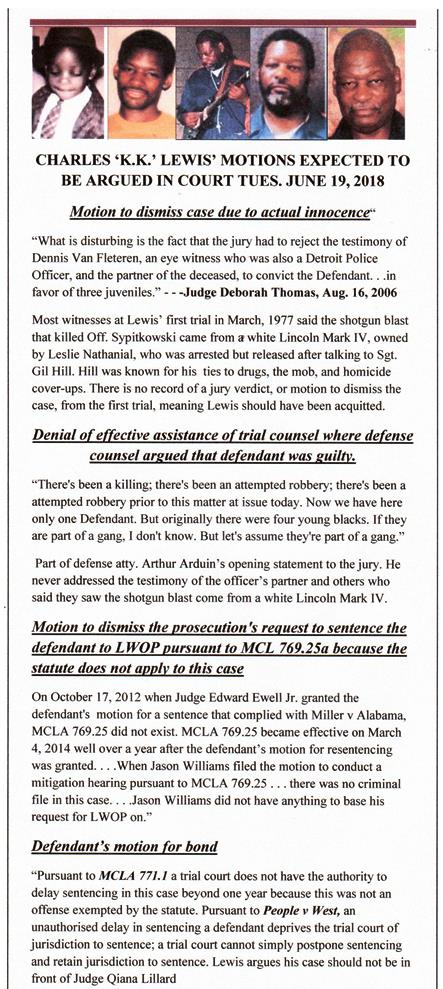 Lewis is asking all who support him and oppose the criminal injustice system that still flourishes in Detroit 42 years after his conviction, to pack the courtroom. He is one of 247 juvenile lifers still being held in state prisons despite two U.S. Supreme Court rulings declaring juvenile life without parole unconstitutional.
Lewis is asking all who support him and oppose the criminal injustice system that still flourishes in Detroit 42 years after his conviction, to pack the courtroom. He is one of 247 juvenile lifers still being held in state prisons despite two U.S. Supreme Court rulings declaring juvenile life without parole unconstitutional.
He will appear before Wayne County Circuit Court Judge Qiana Lillard in Rm. 5o2, at 9 a.m. for post-conviction hearings on four motions he filed himself.
Federal criminal defense attorney Sanford Schulman, who has visited Lewis twice at the Lakeland Correctional Facility in Coldwater, Michigan, is representing Lewis.
Lewis’ docketed motions are summarized in the box at left, and fully linked below this story.
Also outstanding is his June 23, 2017 Objection to an Order issued by Judge Lillard Nov. 11, 2016. She refused to honor State and U.S. Supreme Court precedents that mandate dismissal of criminal cases when the official court records are lost. She said last year that she would hear the issues in that Objection in upcoming hearings.
Numerous boxes of Lewis’ court files went missing sometime after 2012, when he filed a motion asking Judge Gershwin Drain to implement Drain’s earlier order of April 3, 2000 dismissing Lewis’ murder case after the state failed to hold a Pearson evidentiary hearing within 30 days as mandated.
Drain, whose daughter was then an Assistant Wayne County Prosecutor, denied he had anything to do with Lewis’ case, accused Lewis of forging the order, and hacking into the court’s Register of Actions, which is accessible only to the Wayne County Clerk and County Judges. Neither Lewis nor any other MDOC prisoner has access to the Internet.
That Register of Actions currently shows that Lewis was convicted by a jury on April 3, 2000 in front of Judge Gershwin Drain. Everything from 1976 on is missing.
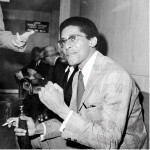
Activist attorney Kenneth Cockrel Sr. called Maher a racist.
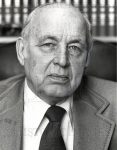
Recorder’s Court Judge Joseph Maher
Lewis, known to many friends as “K.K.,” was a gangly teen-ager weighing 150 lbs. when he was hauled into Detroit Recorder’s Court in March, 1977. He was charged with the murder of Gerald Sypitkowski, 27, a white off-duty Detroit police officer, on July 31, 1976, outside Oty’s Bar on Harper and Barrett.
He faced Recorders Court Judge Joseph Maher, known for his failed attempt to disbar militant Black attorney Kenneth Cockrel, Sr., for calling Maher “a racist monkey, a honky dog, and a racist pirate,” outside of the courtroom during the trial of Alfred Hibbitt. Hibbitt was accused of killing a police officer when Detroit police attacked a meeting of the Republic of New Afrika held at the New Bethel Baptist Church in 1969.
Maher also facilitated the acquittal of Detroit officer Raymond Peterson, a member of the DPD S.T.R.E.S.S. unit, for one of 22 murders of unarmed men, mostly Black, during the early 1970’s.
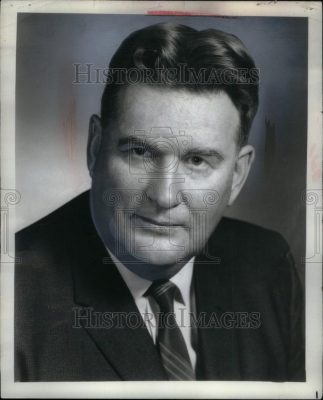
Recorders Court Judge Thomas Poindexter
Attorney M. Arthur Arduin, Jr. was appointed to represent the teen. Arduin was once the campaign manager for Judge Thomas Poindexter, who headed the Greater Detroit Homeowners’ Council, devoted to keeping Blacks out of white neighborhoods. Arduin was also rumored to have ties to organized crime in Detroit.
Poindexter additionally became notorious for setting aside, and later dismissing, a jury verdict of “felonious assault” against white Detroit officers Jay Hammer and Charles Springer in the death of 27-year-old Leslie Wayne Armstrong, who was Black, in 1978. He said “race” affected the verdict.
The officers had stopped Armstrong for outstanding traffic warrants at Kercheval and Dickerson. Witnesses, including a reserve officer, said one later held Armstrong under his chin with a heavy police flashlight, while the other beat him with a second flashlight. He was pronounced DOA at Detroit General Hospital. Coroner Werner Spitz declared his death a “possible asphyxiation.”
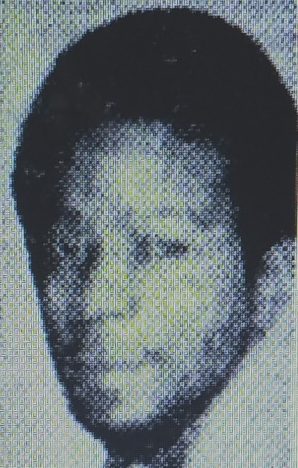
Leslie Wayne Armstrong, killed by Detroit cops 1978
Detroit had just elected its first Black Mayor, Coleman A. Young, who had run against Police Chief John Nichols on a platform critical of racist police treatment of Blacks.
But the city remained in turmoil. The New York Times reported that in 1975, Detroit experienced 600 homicides, the last involving a cop killing a Black man because he refused an order to “halt.”
“At seventeen I was ald enough to know that being accused of killing a cop in Detroit was a death sentence,” Lewis recalls in a vivid life history he wrote shortly after his incarceration.
“The Detroit Police Department terrorized the black community in the fifties, sixties and seventies with brutal beatings and senseless murders. It was no secret in the hood that during the times when Detroit had the highest murder rate in the country, that most of the murders were committed by rogue police officers. Black males were routinely the victims of police brutality. Something as harmless as ignoring an officer’s command to walk to his squad car could get you killed.”
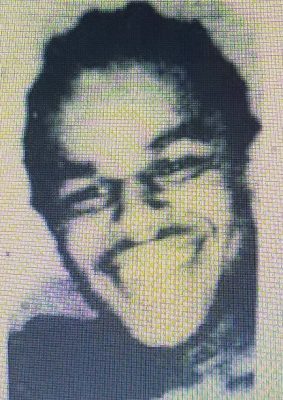
Obie Anthony Wynn, 18
A year before Sypitkowski’s killing, on July 28, 1975, a white bar owner named Andrew Chinarian shot Obie Anthony Wynn, 18, father of a two-year-old son, in the back of the head in the Bolton Bar’s parking lot, according to the coroner. Wynn’s friend Michael Brown watched. Brown said Chinarian then began beating Brown in the chest with his gun. Brown said other whites from inside the bar began forming a mob.
The killing touched off three days of rebellion by angry youth from across Detroit, who poured out into the neighborhood around Livernois and Chalfonte, throwing rocks and bottles and re-distributing the wealth by breaking into stores owned by the well-to-do.
Chinarian was charged with second-degree murder, but that was eventually reduced to a misdemeanor charge of careless and reckless use of a firearm resulting in death. Judge Leonard Townsend sentenced him to six months in DeHoCo, three years probation, and a $300 fine.
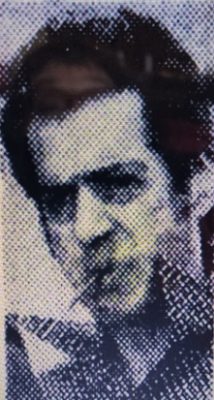
Andrew Chinarian
At the time, Lewis was living with his parents Rosie and Herbert Lewis and four younger siblings he often looked after, at 12631 Kilbourne St. on Detroit’s east side. His father worked for the Federal Aviation Administration and was frequently assigned out of town, while his mother worked at a General Motors plant.
“We were one of only two Black families living on that block at the time,” Lewis’ mother Rosie Lewis recalled.
Lewis’ father Herbert Lewis was falsely accused of robbing a Farmer Jack at Gratiot and Bellevue on Oct. 6, 1972. But Lewis and his wife produced “employment records. . . proving beyond question that Lewis was in Oberlin, Ohio, working for the Federal Aviation Administration on October 6, 1972, the day of the robbery. The robbery charge was therefore dropped, and the criminal case was dismissed at the preliminary examination on March 30, 1973.” (See Lewis v Farmer Jack Division, Inc.327 N.W.2d 893.)
Rosie Lewis says police continued to harass their family after the charges were dropped and her husband sued the city, initially winning $40,000 in a jury verdict for “false arrest.
At the time of his arrest, Lewis was just short of graduation from Finney High School.
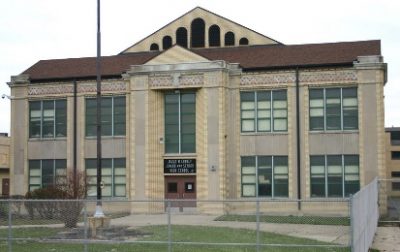
Finney High School then; it has since been demolished.
“Finney High School was a changing school in the early seventies,” Lewis wrote in his life history. “The once all-white school was giving way to busing and blacks. . . Some of the teachers didn’t want to change with the times. The teacher that I had for English Eight was one of those teachers.”
Lewis said the teacher stopped him the minute he entered his classroom to interrogate him. Lewis told the teacher he wanted to be a journalist, and work for the school paper and yearbook.
“Well, here is all you have to do,” the teacher told him mockingly. “Go to the gym during this period, go to the library, or hang out in the parking lot. Do anything but show up for class and you’ll get an ‘A’ from me.”
But Lewis became an accomplished writer and a reporter for various newspapers during his imprisonment. His voluminous pro se legal filings attest to his writing and analytical skills. He has earned a paralegal certificate among other degrees in prison.
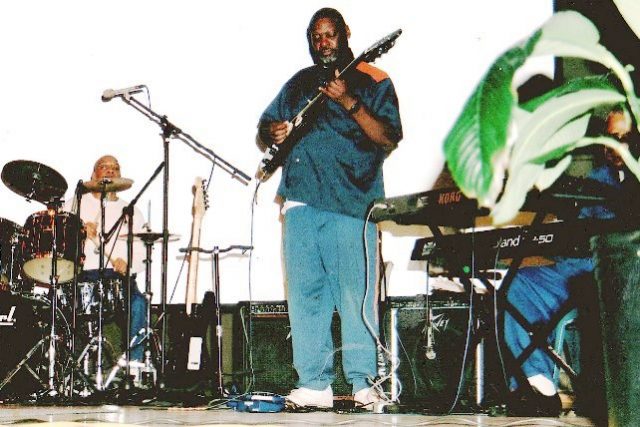
Charles Lewis playing in prison band. His fellow musicians have extolled his musical talent, calling it “world-class.”
Lewis has told Judge Lillard and his previous attorneys that he has been “studying law since before you were born.” He currently works as a clerk at the law library at the Lakeland Correctional Facility, and has earned a certificate as a paralegal, among other certificates. He is well respected among many fellow prisoners for his assistance to them in their cases.
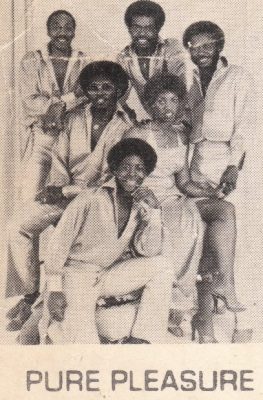
Lewis’ defense atty. did not call band members or audience to testify.
Willis X. Harris, editor of the Michigan Lifers Report, says that numerous prisoners call him about articles on the man they call “K.K.” expressing their respect for and gratitude to him for his leadership and assistance on legal and personal matters.
He was already an accomplished musician. At the age of 4, he began playing guitar, piano and other instruments, a child prodigy following in his maternal grandfather’s footsteps. Today, he hones that talent playing in prison bands, and writing and arranging music for concerts.
He says he was with a band called “Pure Pleasure” on the night of July 31, 1976, at the United Auto Workers Local 212 Hall, during the time Sypitkowski was killed. His defense attorney did not call members of the band or audience to testify as alibi witnesses. Lewis was looking forward to graduation, a possible athletic college scholarship, and a prosperous career in music.
Below, his mother reads testimony from Dennis Van Fleteren, Sypitkowski’s partner, given at Lewis’ trial in 1977. Van Fleteren and numerous others standing nearby saw Sypitkowski shot by the driver of a white Lincoln Mark IV, who was later arrested but released on the order of then Sgt. Gil Hill.
The video is by MacSpeaking and was done after an earlier court hearing on Lewis’ case. Please note that court date in video is not accurate. It was delayed numerous times until the upcoming hearing Tues. June 19, 2018 at 9 a.m.
Van Fleteren got the license number of the car, and police arrested its driver, Leslie Nathaniel. Their version of events was published in a Detroit Free Press article the next day, by reporters at the scene. It was also given at two trials in March and November, 1977.
Then Sgt. Gil Hill, however, told the reporters that Sypitkowski was not the victim of a “drive-by shooting.” Hill was later investigated by the FBI for alleged ties with organized crime and accused by FBI informant “White Boy Rick” of falsifying homicide reports. He passed in 2012.
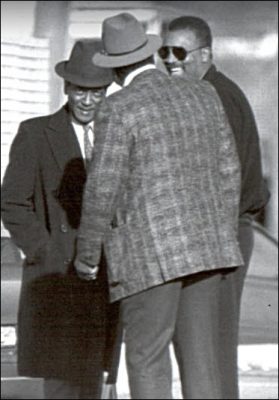
Gil Hill in FBI surveillance photo conferring with known drug dealer Willie Volsan and Sgt. James Harris.
Although no eyewitness reported the presence of Black teens at the scene in the mainly white neighborhood when Sypitkowski was killed, Chief Investigative Officer Sgt. Marvin Johnson named Lewis, Jeffery Mulligan, 16, and Ronald Pettway, 16 as Sypitkowski’s killers in his report. Mulligan and Pettway’s names were later dropped as defendants after they agreed to testify that Lewis committed the murder. This was never revealed to Lewis’ jury.
According to Lewis’ homicide report, unidentified “confidential informants” named him and the others. They were never called to testify at his trials. Lewis and others believe the killing of Sypitkowski was a ‘hit’ ordered either by the mob or elements within the Detroit Police Department.
After his previous paid attorney withdrew from his case in a surprise hearing Jan. 31, 2018, Lewis filed four “pro se” motions. He says attorney Schulman has assured him he will get them on the record.
The motion to dismiss his case due to actual innocence refers in large part to an Aug. 16, 2006 opinion written by noted Third Circuit Court Judge Deborah Thomas. In that opinion, she upheld Lewis’ contentions that jury instructions by Judge Maher, which included a statement that he was “guilty” of another crime, were highly prejudicial and affected the jury verdict.

Judge Deborah Thomas
Only a small portion of Lewis’ first trial transcript exists in the files that Judge Lillard has said she may certify in order to move on with the prosecution’s motion for renewed juvenile life without parole.
However, Judge Thomas said that she “thoroughly” read the first trial transcript in 2006, and that she found no documentation of Maher’s reason for dismissing the jury in that first trial in March, 1977, or any motions by either prosecution or defense for a “mistrial” after the jury had deliberated for over a week. She said that meant that Lewis should have been considered acquitted, and not tried again, because that would have been “double jeopardy.”
Thomas also upheld Lewis’ contention that he was denied effective assistance of counsel when Recorders Court Judge Gerald Thomas fired defense attorney Rosemary Robinson after she won a Court of Appeals verdict ordering that a “Pearson” evidentiary hearing must be held at Lewis’ request. The attorney who represented Lewis at the hearing was not familiar with the issues in his case, and given only a short meeting with Lewis to prepare for the hearing. Witnesses Lewis wanted subpoenaed did not testify at the hearing.
Lewis’ motion regarding ineffective assistance of counsel relates to his trial attorney, Arthur Arduin, who essentially argued in his opening and closing statements that Lewis was guilty. Arduin characterized him as a member of a young Black “gang,” and said that the three Black juveniles who testified against him should also have been charged.
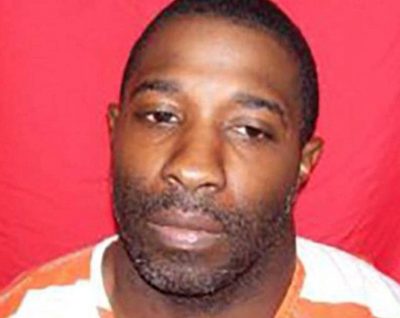
Robert McCoy, Louisiana death-row prisoner
The U.S. Supreme Court just overturned the conviction of death row prisoner Robert McCoy May 14, 2018, in McCoy v. Louisiana because his lawyer argued he was guilty, in an unsuccessful attempt to get the death penalty off the table. McCoy had argued strenuously with his attorney that he did not want to plead guilty.
The U.S. Supreme Court ruled, “The Sixth Amendment guarantees to each criminal defendant ‘the Assistance of Counsel for his defence.’ The defendant does not surrender control entirely to counsel, for the Sixth Amendment, in ‘grant[ing] to the accused personally the right to make his defense,’ speaks of the ‘assistance’ of counsel, and an assistant, however expert, is still an assistant.” The Court said the decision to plead ‘guilty’ or ‘not guilty’ falls entirely within the control of the defendant alone. See ruling at http://voiceofdetroit.net/wp-content/uploads/McCoy-v-Louisiana-1.pdf
Lewis’ motion to strike the prosecutor’s attempt to re-sentence him to life without parole based on state statute MCL 769.25a argues that the action is ex post facto. He says he was already set for re-sentencing by Judge Edward Ewell in October, 2012, long before the controversial state statutes on re-sentencing juvenile lifers were effected in 2014. In fact, Ewell’s order was upheld by the U.S. Supreme Court by 2013 after the prosecution challenged it.
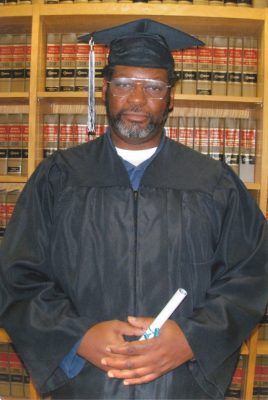
Charles Lewis after class graduation in prison.
The Michigan ACLU has already won its case against a portion of MCL 769.25 which held that re-sentenced juvenile lifers would not be allowed to use “good time” credits in computing their time served. Both U.S. District Court Judge Mark Goldsmith and the Sixth Circuit Court of Appeals struck that portion of the law.
Finally, Lewis is arguing that he is due a bond in his case, that he has been without an actual sentence since Ewell’s order in 2012, nearly six years, and also that Judge Lillard has now relinquished her right to re-sentence him because of the delay of more than one year.
Read his full motions below:
http://voiceofdetroit.net/wp-content/uploads/Charles-motion-for-bond-1.pdf
Also see his June 23, 2017 Objection to Judge Lillard’s order to reconstruct his criminal file at:
http://voiceofdetroit.net/wp-content/uploads/C-Lewis-Objections-6-23-17.compressed-2.pdf
Read Judge Deborah Thomas’ opinion of Aug. 6, 2016 at
http://voiceofdetroit.net/wp-content/uploads/DThomasOpinion-3.pdf
RELATED STORIES:
#TAKETHEKNEE! FRI. OCT. 6; FREE CHARLES LEWIS, INNOCENT, IN PRISON 41 YEARS; COURT FILES DESTROYED
‘ROGUE JUSTICE!’ FREE ANOTHER INNOCENT DETROITER, CHARLES LEWIS, NOW! HEARING WED. FEB. 15 @ 9 AM.
#FREECHARLESLEWISNOW, #FREEMICHIGANJUVENILELIFERSNOW, #ENDMASSINCARCERATION, #ENDSCHOOLTOPRISONPIPELINE




